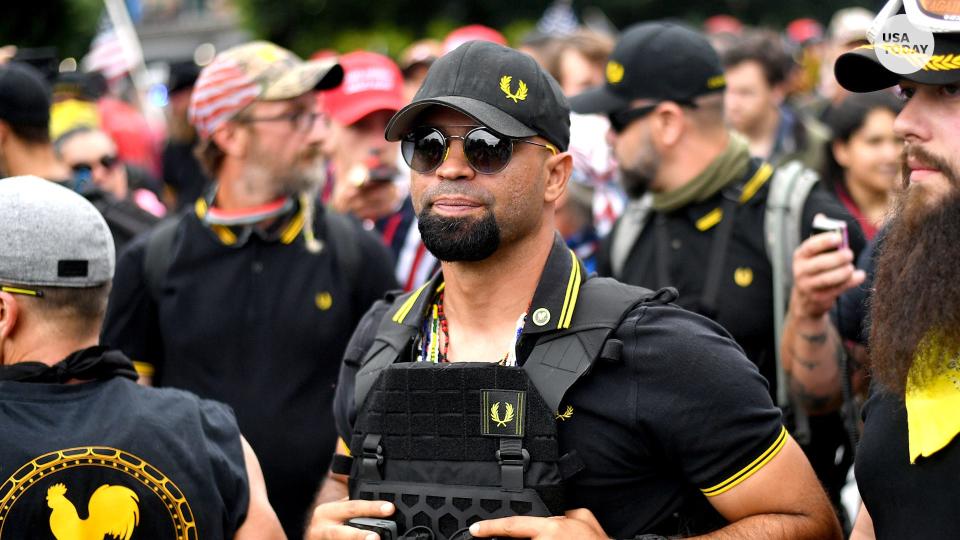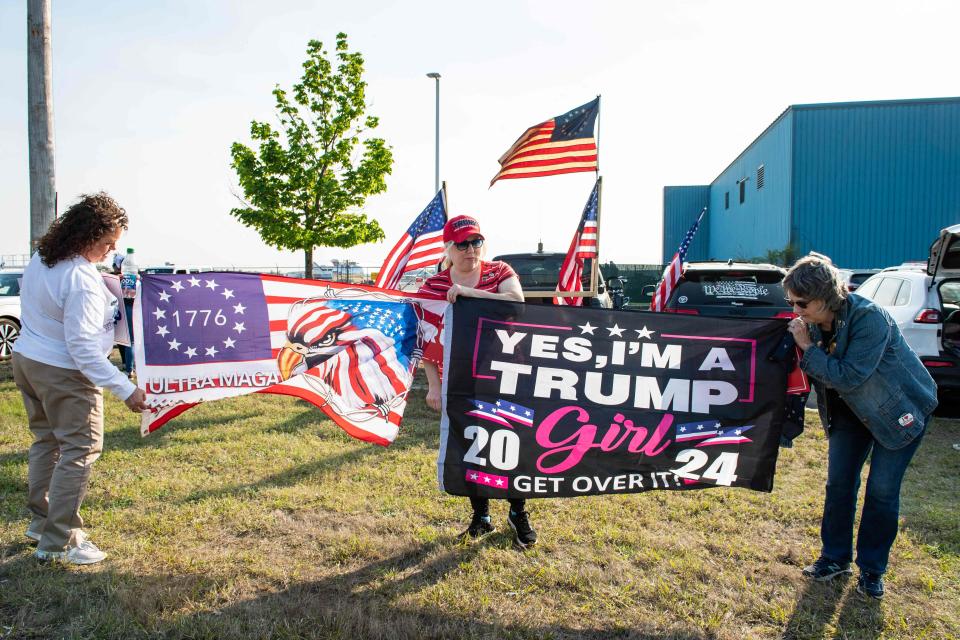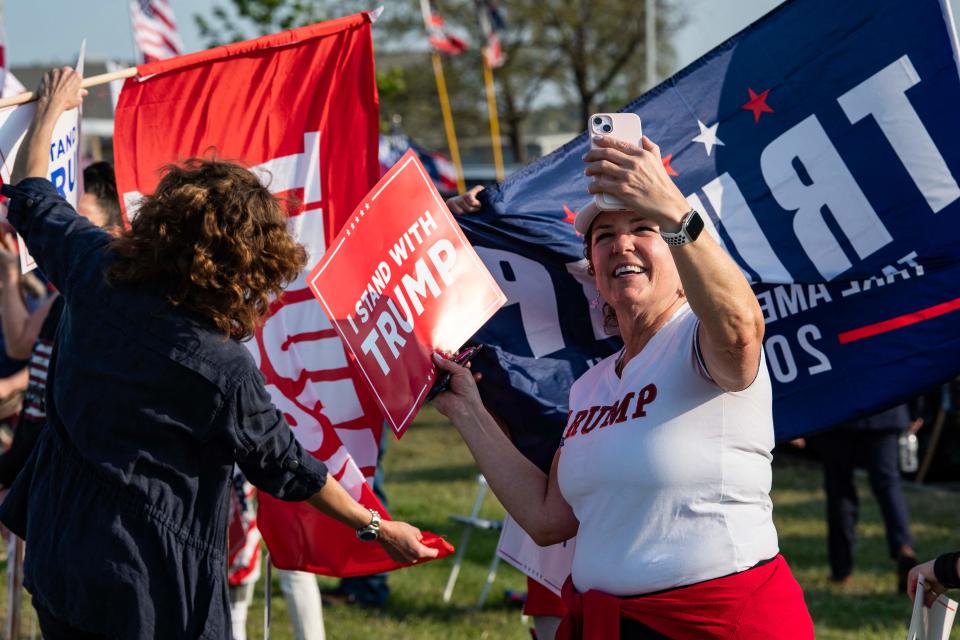Trump-CNN town hall: 5 things for Florida to consider on Jan. 6 pardons, abortion, debt. etc.
- Oops!Something went wrong.Please try again later.
Missed former President Donald Trump's appearance at the town hall meeting hosted by CNN on Wednesday evening? We got some of the highlights as they pertain to what's happening in Florida politics.
The event, which lasted for just over an hour, was held in New Hampshire, one of the earliest GOP primary states in the 2024 nomination season. But there was plenty discussed for voters in Florida to think about, too.
The topics ranged from Trump's baseless assertions that the 2020 presidential election was "rigged," the Jan. 6 violence, border security, the war in Ukraine, the economy and energy policy. And while Florida is a state Trump won comfortably in 2020, and went crimson in 2022, some of the former president's statements may give people here reason to pause and consider.
Here are five takeaways.
Trump-DeSantis battle: Attack ads, social media posts, vitriolic speeches: Trump's feud with DeSantis is personal
1. Trump said he'd pardon 'many' from Jan. 6 attack, but what about Florida Proud Boys?
Trump said he would issue pardons for "a large portion of those" convicted on Jan. 6-related charges.
"I am inclined to pardon many of them. I can't say for every single one, because a couple of them probably they got out of control," Trump said.
That is no small issue in Florida. Tallies by the George Washington University Program on Extremism show the 102 people from the state charged for their roles in the deadly and destructive riot at the U.S. Capitol that day — from beating police officers to vandalism to seditious conspiracy — tops the nation.

Just last week, four Proud Boys, including Floridians Enrique Tarrio of Miami-Dade County and Joseph Biggs of Volusia County, were convicted of seditious conspiracy. Asked about pardons for the four, Trump said, "I don't know, I have to look at their case, but I will say in Washington, D.C. you cannot get a fair trial."
Trump himself is under investigation by a U.S. Justice Department special counsel for his role in the Jan. 6 violence as well as conducting what a House committee called a coup attempt to overturn the 2020 presidential election.

2. Trump reportedly added $7.8 trillion to debt, but supports default 'because now I'm not president'
Trump said the nation's $33 trillion debt is a "number nobody thought possible" and called for a debt default if the Biden White House does not agree to "massive" budget cuts.
This is another issue of paramount concern in Florida.
Data from the 2020 U.S. Census shows that 21% of the state residents are 65 and older. They are the ones who arguably have the most at risk if a debt default slashes the value of their retirement investments and incomes. Or if social programs for older residents end up getting axed in budget reductions.
Nonetheless, Trump ordered Republicans to demand deep spending cuts, even as analysts say his administration contributed a staggering $7.8 trillion in added debt during his single term in the White House.
Trump said he would support defaulting on the debt, despite the economic disaster that would ensue.
"I say to the Republicans out there, congressmen and senators, if they don't give you massive cuts, you're going to have to do a default," he said, later adding: "We might as well do it now because we'll do it later."
But asked why he has changed his position from when he was in the Oval Office — he claimed at the time the nation's debt ceiling should not be used as a bargaining chip — Trump said: "Because now I'm not president."

3. From Parkland to Pulse, Trump said 700 million guns are not the problem
Trump said the United States, with a population of 330 million people, has "more than 700 million guns" and "a big mental health problem."
Estimates say there are 400 million firearms in civilian hands in the United States, but that does not count law enforcement and the military. One study in 2017 put per capita ownership of guns in the United States at 120 per 100 people. The runner-up was Yemen at 52 weapons per 100 people.
So, no country comes close to the U.S. in gun ownership and mass murders, and Florida has witnessed its share of tragedies from the Pulse nightclub shooting in Orlando to the one at Marjory Stoneman Douglas High School in Parkland.
Trump was president during the 2018 mass shooting in Parkland. In the aftermath of that massacre, Florida approved groundbreaking red flag laws and raised the age to buy a firearm to 21.
But Trump said he would not support any new restrictions, despite the more than 200 mass shootings that have already occurred this year. The way to make schools and "other places safe," Trump said, is by further arming people and fortressing facilities by "hardening entrances."
In schools, he called for arming 5% of teachers. "Five percent of the teachers would be more than you can ever have if you are going to hire security guards," he said.
4. Abortion: End of Roe led to 'negotiating' and 'deals.' What does that mean for Florida's six-week ban?
Asked by a member of the audience how he would appeal to women voters concerned about the aftermath of the U.S. Supreme Court's Dobbs decision overturning Roe v. Wade, Trump said the ruling "was such a great victory."
Trump said getting rid of Roe "was an incredible thing for pro-life because it gave pro-life something to negotiate with." He added: "Now what's happening, and I see it all over, is deals are being made. Deals are going to be made."
Trump didn't explain how he viewed negotiating and cutting deals as transactions consistent with a deeply personal issue that involves human life, both that of the mother and the unborn child.
He did not reveal what those negotiations were or what deals are being cut. He later repeated that "for the first time the people who are pro-life have negotiating capability."
He did not say whether he supported Florida's six-week abortion ban passed by the state legislature this year, or the 15-week ban approved last year. He did not mention whether those were examples of the negotiations and deals he supported.
Trump said he believes in exceptions for the life of the mother, rape and incest, but demurred on whether he would sign a federal abortion ban. "What I would do is negotiate so the people are happy," Trump said, but did not elaborate.
5. Border security: Trump said family separation policy was deliberate
Trump said the quiet part out loud in discussing his controversial immigration family separation policy. At the time, administration officials, as well as congressional Republicans and others defending the policy, said the taking of children from parents and relatives was done to protect the minors from human smugglers and traffickers.
On Wednesday night, Trump acknowledged, "I know it sounds harsh," but the goal was to deter people from coming to the U.S. by making them fear they would have their children taken away.
"When you have that policy, people don't come," Trump said. "If the family hears that they're going to be separated, they love their family, they don't come."
While the U.S.-Mexico border is far from the Sunshine State, the border crisis hits home anyway.
In fiscal year 2022, federal government reports said record numbers of Cubans, Venezuelans and Nicaraguans — representing three of those most dominant Hispanic populations in South Florida — helped push the overall number of people encountering U.S. Customs and Border Protection officials at the southern border to nearly 2.4 million, an all-time high.
Trump suggested he would reinstate the program if he returns to the White House saying, "We have to save our country" from immigrants.
"When you say to a family that if you come, we're going to break you up, they don't come," he repeated.
Antonio Fins is a politics and business editor at the Palm Beach Post, part of the USA TODAY Florida Network. You can reach him at afins@pbpost.com. Help support our journalism. Subscribe today.
This article originally appeared on Palm Beach Post: What Trump said on CNN about abortion, debt default, Jan. 6 pardons

